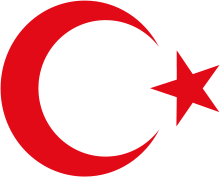Indonesia–Turkey relations
 | |
Indonesia |
Turkey |
|---|---|
Indonesia–Turkey relations are foreign bilateral relations between Republic of Indonesia and Republic of Turkey. The diplomatic relations between Indonesia and Turkey are particularly important because both are Muslim majority countries as well as modern democracies. Both countries serves as the example of how Islam and democracy could coexist and thrive.[1] Diplomatic relations has been established since 1950. Indonesia has an embassy in Ankara.[2] and Turkey has an embassy in Jakarta,[3] and honorary consulate in Medan since May 1996. Both countries are full members of the World Trade Organization (WTO), Organisation of Islamic Cooperation (OIC), Developing 8 Countries and the G20 major economies.
History
Indonesian-Turkish relations can be traced back to the 12th century. Turkish Islamic scholars who visited Indonesia during that period played an important role in the spread of Islam in Indonesia.[4] Relations with the Ottoman Empire (Turkey's predecessor state) began with the 16th century Ottoman expedition to Aceh, in with the response to the Aceh Sultanate's request for assistance against the Portuguese in Malacca[5]
Turkey recognized Indonesia on 29 December 1949 and diplomatic relations were established in 1950. Turkish Embassy in Jakarta was opened on 10 April 1957.
See also
Notes
- ↑ Palash R. Ghosh (March 1, 2011). "Arab nations may look to Turkey and Indonesia as models of modern Islamic states (Part 1)". International Business Times. Retrieved 27 January 2013.
- ↑ Embassy of Indonesia in Turkey
- ↑ Embassy of Turkey in Indonesia
- ↑ "Relations between Turkey and Indonesia". Ministry of Foreign Affair, Republic of Turkey. Retrieved 27 January 2013.
- ↑ Reid, Anthony (February 2005), The Ottomans in Southeast Asia, ARI Working Papers 36, Asia Research Institute, National University of Singapore
External links
| ||||||||||||||||||||||||||||||
| ||||||||||||||||||||||||||||||||

